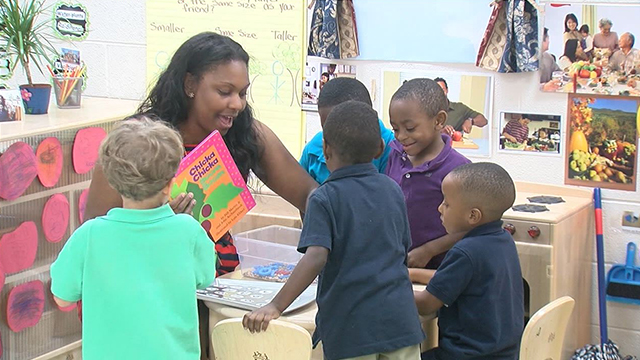NASHVILLE, Tenn. (WKRN) — Metro Nashville leaders are taking a new step toward making childcare more accessible and affordable for struggling families. Right now, it’s difficult to find a place for young children to stay while their parents work, and when they do find that care, it’s very expensive.
“The nationwide drive is that child care costs no more than 7% of a family’s annual income,” said United Way of Greater Nashville Education Director Brandon White. “We’re very far from that number, and this study will help us determine just how far from that number we really are.”
According to the Tennessee Commission on Children and Youth, the 2024 market rate cost for childcare in Davidson County was $16,776.76 for infants and $15,340.00 for toddlers. With the U.S. Census reporting that the most recent median household income for Nashville as $80,217, these costs are well beyond the goal of child care taking no more than 7% of a family’s income.
The Metro Council will vote on a resolution Tuesday awarding a grant of $200,000 to the United Way for a countywide, childcare study.
White explained they plan to use this study to narrow down the true cost of providing childcare so Metro leaders in the public and philanthropic sectors can designate funding more efficiently.
“Many times we talk about it in terms of a childcare centers license capacity to serve children. That’s a little bit like trying to buy a car when all you know is the size of a dealer’s parking lot, right? You don’t know what kind of inventory might be available and what the true capacity of that center looks like,” said White. “What this study will actually do is drill down beyond what’s publicly available, to understand capacity by age at each center, to understand the cost of care by age at each center, to understand their staffing needs, and to understand not just what families can afford to pay for care, the market value of care, but actually what it costs the center to operate so that we can better implement long term subsidies from both private philanthropy and the public sector.”
According to the 2024 State of The Child Report, there were about 3.7 childcare centers for every 1,000 children aged 0-12 in Davidson County.
“Our county is not considered a childcare desert, but we have deep pockets of lack of access, and those typically align with disproportionate economic needs,” he said. “Especially the southeast Antioch area, that get as high as seven children for every one available child seat. And so this is still a pretty significant problem.”
In addition to providing a place for children to stay safely during the workday, childcare centers can have long-term impacts on a child’s life. United Way of Greater Nashville houses 11 childcare centers for Read to Succeed and 90% of their students are meeting benchmarks for development. White explained these facilities can also make children more prepared for Kindergarten.
“We’ve implemented a curriculum that requires instructors to be gearing their instruction, their resources and their assessment strategies to getting kids ready for pre-K and getting kids ready for kindergarten,” he said. “That allows them to be more successful, not just in benchmarks like third grade literacy and sixth grade attendance, but they’re more likely to graduate high school and they’re more likely to be long term economic self sufficient.”
He said the Raphah Institute is taking the lead on looking into family and home-based childcare.
“This would be your aunt and uncle. This would be your grandma. This would be your neighbor. And the thing is, a lot of those facilities are not licensed, but they’re not required to be,” said White. “So what can we do collectively? I think that’s where the resource allocation process comes into play. Are we getting curriculum materials into those centers? Are we helping them strengthen the quality of care that they’re providing?”
Some families also don’t need childcare for the entire workday five days per week, so those needs will be examined as well.
“With our need across Nashville, it will take all types of care, not just in home, not just center based, but we also have to think about gaps and things like sick care. So if your child is sick and can’t go to school, do you have an a backup opportunity, right? A drop in care. Maybe you don’t need care four or five days a week,” said White.
They’re hoping to get participation from as many providers as possible once the study is up and running so leaders can take action as soon as the data points them in the right direction.
“We are collectively looking at how to expand childcare capacity in areas with the highest need, and that we’re doing that while adding streamlines and removing barriers,” said White. “There is a group of legislators right now that is helping us look at what laws get in the way for the regulatory process at the local level. Additionally, we want to be able to put our resources where they’re needed the most in a collective capacity.”
He explained that childcare is something that affects everyone, even if you don’t have a young child yourself.
“I think a lot of people don’t realize that it’s a shared responsibility. We cannot think of childcare as our responsibility only when we have young kids, right? And this is something that businesses need to think about differently. It’s something that our city needs to think about more. It’s something that we as philanthropy need to be thinking about and as a community, because it really does affect the lives of every Nashvillian when our child care supply is not adequate.”




